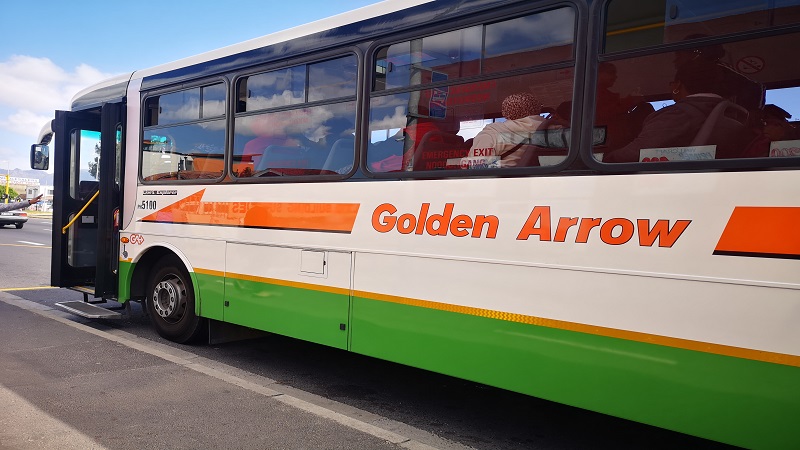As the number of Co-VID19 or coronavirus infections across the globe steadily increases, dozens of countries have implemented plans to contain and limit its spread. This includes South Africa, where President Cyril Ramaphosa joined several European countries in declaring a national state of disaster on Sunday.
In his announcement, Ramaphosa advised the public to avoid all non-essential domestic travel – particularly by air, rail, taxis and bus. But, in a mixed class country, this has not reassured hundreds of thousands of commuters who rely on public transport on a daily basis.
Transport Minister Fikile Mbalula announced on Monday that random screenings will be conducted at train stations and taxi ranks nationwide and that all public transport will need to undergo regular sanitation. He spoke at an inter-ministerial media briefing in Pretoria.
According to Golden Arrow spokesperson, Bronwen Dyke-Beyer, the service had anticipated the potential need for increased measures and role-players met last week to set up designated task teams.
“We just want to ask our passengers not to panic,” she emphasised during a telephonic interview with VOC.
“Golden Arrow takes the well being, not only of our passengers, but also of our staff very seriously. We meet daily with our task teams. I’m going to be getting an in-depth update today (Tuesday),” she assured.
Dyke-Beyer encouraged commuters to take the basic hygiene precautions: “As our president said, it’s also time for us to take responsibility for ourselves.”
Tips on how to stay healthy and avoid the virus are available on the World Health Organisation (WHO)’s website in an easy-to-read format. The advice includes regular washing of the hands, coughing and sneezing etiquette and generally clean, healthy habits.
“Trying to limit contact with surfaces, should be a practice we all start doing. If you do have to cough or sneeze; do so into your elbow. Wash hands regularly,” she said.
Ramphosa had, during his announcement, reiterated the call to maintain social distancing and limited social contact.
“There is the issue of social distancing, which is made quite difficult if you’re travelling public transport, particularly in Cape Town where our people use Metrorail. People still need to get to work and make a living,” noted the spokesperson.
Dyke-Beyer explained that although busses are cleaned daily, the service will be instituting increased hygienic measures to ensure the safety of commuters and staff.
“We are in the process of procuring a special surface cleaning spray which works for 24 hours at a time and its guaranteed to kill viruses from the corona family. As soon as we have that, we’ll be spraying buses every single day before they go out.”
“We are also looking at procuring hand sanitizers, gloves, masks… all of those things,” she added.
Dyke-Beyer committed to keeping commuters and the public up to speed with any developments through regular updates.
”Please open the windows in the bus! We get so much flack when we ask people to open the windows, many people don’t like it. But extra ordinary times call for extra ordinary measures.”
Below are the recommendations set out by the WHO (https://www.who.int/health-topics/coronavirus). The website also has visuals (https://www.who.int/emergencies/diseases/novel-coronavirus-2019/advice-for-public) available:
Wash your hands frequently
Regularly and thoroughly clean your hands with an alcohol-based hand rub or wash them with soap and water.
Why? Washing your hands with soap and water or using alcohol-based hand rub kills viruses that may be on your hands.
Maintain social distancing
Maintain at least 1 metre (3 feet) distance between yourself and anyone who is coughing or sneezing.
Why? When someone coughs or sneezes they spray small liquid droplets from their nose or mouth which may contain virus. If you are too close, you can breathe in the droplets, including the COVID-19 virus if the person coughing has the disease.
Avoid touching eyes, nose and mouth
Why? Hands touch many surfaces and can pick up viruses. Once contaminated, hands can transfer the virus to your eyes, nose or mouth. From there, the virus can enter your body and can make you sick.
Practice respiratory hygiene
Make sure you, and the people around you, follow good respiratory hygiene. This means covering your mouth and nose with your bent elbow or tissue when you cough or sneeze. Then dispose of the used tissue immediately.
Why? Droplets spread virus. By following good respiratory hygiene you protect the people around you from viruses such as cold, flu and COVID-19.
If you have fever, cough and difficulty breathing, seek medical care early
Stay home if you feel unwell. If you have a fever, cough and difficulty breathing, seek medical attention and call in advance. Follow the directions of your local health authority.
Why? National and local authorities will have the most up to date information on the situation in your area. Calling in advance will allow your health care provider to quickly direct you to the right health facility. This will also protect you and help prevent spread of viruses and other infections.
Stay informed and follow the advice given by your healthcare provider
Stay informed on the latest developments about COVID-19. Follow the advice given by your healthcare provider, your national and local public health authority or your employer on how to protect yourself and others from COVID-19.
Why? National and local authorities will have the most up to date information on whether COVID-19 is spreading in your area. They are best placed to advise on what people in your area should be doing to protect themselves.
VOC






 WhatsApp us
WhatsApp us 

